Dangote Refinery: 7 Important Facts and Figures you Should Know
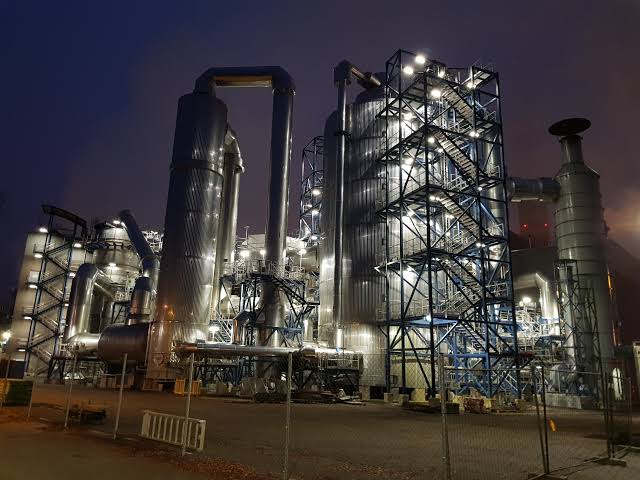
The Dangote oil refinery is an ambitious project being undertaken by Africa’s richest man Aliko Dangote. when complete, the refinery will have the single biggest impact on Nigeria’s economy as it is expected to be a lasting solution to the country’s heavy dependence on the importation of petroleum products for domestic consumption.
Earlier in November, Nigeria slipped into economic recession and experts believe the main cause is the fact that the country has had to deplete its foreign earnings to import refined petroleum products in order to meet local demands.
Nigeria currently has 4 refineries all of which are comatose;
-
The first refinery in Port Harcourt was commissioned in 1965 to process 60,000 barrels of oil per stream day (bpsd), as well as the second plant commissioned in 1989, which has a capacity of 150,000 bpsd.
Both refineries have a combined capacity of 210,000 barrels per stream day making it the biggest oil refining company in Nigeria. They both had the last Turn Around Maintenance (TAM) in 2000.
- The Warri refinery was established in 1978 with a refining nameplate capacity of 100,000 barrels per stream day plant and was debottlenecked to 125,000 barrels per stream day in 1987. The refinery is located at Ekpan, Warri, Delta State, and it is operated by the Warri Refining & Petrochemicals Company (WRPC) Limited, an NNPC subsidiary.
-
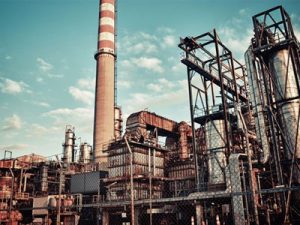
Kaduna Refinery - The Kaduna refinery has a name plate refining capacity of 110,000 barrels per day and is located in Kaduna, KadunaState. The plant is run by the Kaduna Refining and Petrochemicals (KRPC) Limited, a subsidiary of the Nigerian National Petroleum Corporation (NNPC) and has a complex conversion configuration. The KRPC possesses a fuels plant commissioned in 1983 and the 30,000 MT per year Petrochemical Plant in 1988. The refining plant has two (2) distillation units that utilize Escravos and Ughelli crude oils’ for fuels production and imported heavy crude oil for lube base oil, asphalt and waxes.
Dangote oil refinery location and site details
The refinery is located in Lagos Nigeria, and is being developed on a 2,635 hecters of land site on the Lekki Free Zone near the Lekki Lagoon, along the coast of Atlantic Ocean.
The geographical location of the refinery is ideal for easy transshipment of refined petroleum products to the international markets. Most African countries who also rely on Europe and America for refined petroleum products will be ready markets.
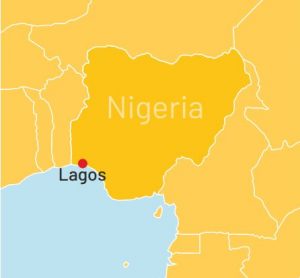
Dangote has already built a jetty near the project site to receive heavy equipment for the refinery construction. 1,100 kilometers of pipeline has been constructed to bring crude oil from the Niger-Delta where a bulk of Nigera’s crude oil is located.
Processing capacity
Dangote refinery is a 650,000 barrels per day (bpd) integrated refinery and petrochemical complex. When completed, the facility will meet all of Nigeria’s petroleum needs and still have excess for export. Crude oil will be fractionally distilled into 10.4 million tonnes (Mt) of gasoline, 4.6Mt of diesel, and 4Mt of jet fuel a year.
It will also annually produce 0.69Mt of polypropylene, 0.24Mt of propane, 32,000t of Sulphur, and 0.5Mt of carbon black feed.
Infrastructure facilities
The infrastructure facilities for the refinery complex include a pipeline system, access roads, tank storage facilities, and crude and product-handling facilities.
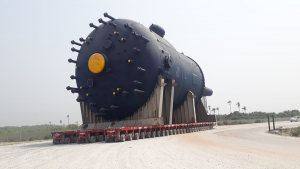
A marine terminal, including a breakwater, jetty and harbour, has also been developed as part of the project.
Other facilities developed to support the project include an administrative building, guardhouses, fire station, and pump stations.
The refinery complex will also house a fertilizer plant, which will utilize the refinery by-products as raw materials.
read also: Why is Eko Atlantic City taking forever to complete?
Contractors involved
Engineers India is the engineering, procurement, and construction (EPC) contractor for the project.
Honeywell UOP was contracted for the supply of catalyst regeneration and dryer regeneration control systems, column trays, heat exchanger tubes, a modular CCR unit, and catalyst coolers among other equipment.
C&I Leasing was contracted for providing transportation and installation services for mooring systems and subsea pipelines of the refinery.
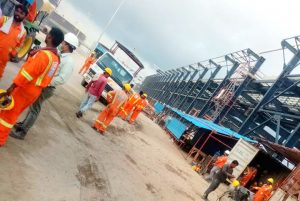
Hang Xiao Steel Structure Company received a $112m contract to provide steel structure for the refinery.
Jan De Nul Group was engaged for carrying out land reclamation works.
MAN Diesel & Turbo was contracted for supplying two compressor trains, while Air Liquide Engineering & Construction was contracted for supplying the SMR units.
Fabtech (18 columns), Schneider Electric (process automation systems), SOFEC (Catenary Anchor Leg Mooring buoys), and WABAG (raw water treatment plant) are the other suppliers involved in the Dangote refinery project.
Financing for Dangote refinery
A group of local and international banks led by Standard Chartered Bank has agreed to provide a $3.3bn syndicated loan facility for the project.
The United States Trade and Development Agency is providing an N251.3bn ($0.997b) training grant for the human resource development for the refinery operation. Nigeria’s central bank would provide guarantees for about 575 billion naira in local currency for 10 years, with African Development Bank providing a $300 million loan. Trade banks from China, India and some European countries are also in the mix, Dangote said.
Jobs at Dangote oil refinery
When fully operational, the refinery will employ about 10,000 people directly and another 300,000 will benefit indirectly. This will include jobs such as taxi drivers, bartenders, restaurant owners and alot more. An entirely new economy is being created in Ibeju Lekki near the project site.
Dangote refinery completion date
The completion of the project was scheduled for 2020 but progress was interrupted by the global outbreak of covid-19. Work is still on-going at the Dangote Refinery, and is expected to be commissioned in the first quarter of next year.
Power generation
The Dangote refinery complex will have the capability to generate 400MW of electricity from its own power plant, that is more than enough to power the complex. by comparism, this is able to meet the total power requirement of Ibadan DisCo.
The Dangote refinery will be a game changer for not only Nigeria, but the rest of Africa as well. The country will no longer need to import petrol despite having the second largest crude oil reserves on the continent. the refinery will also save Nigeria about $10 billion a year in badly needed forex.
Which company is building the Dangote Refinery?
The Dangote Refinery is a mega project that has so far gulped over $23 billion. Multiple companies are involved in building the refinery project including;
1. Honeywell UOP that was contracted for the supply of catalyst regeneration and dryer regeneration control systems, column trays, heat exchanger tubes, a modular CCR unit, and catalyst coolers among other equipment.
2. C&I Leasing was contracted for providing transportation and installation services for mooring systems and subsea pipelines of the refinery.
3. Hang Xiao Steel Structure Company received a $112m contract to provide steel structure for the refinery.
4. Jan De Nul Group was engaged for carrying out land reclamation works.
5. MAN Diesel & Turbo was contracted for supplying two compressor trains, while Air Liquide Engineering & Construction was contracted for supplying the SMR units.
6. Fabtech (18 columns), Schneider Electric (process automation systems), SOFEC (Catenary Anchor Leg Mooring buoys), and WABAG (raw water treatment plant) are the other suppliers involved in the Dangote refinery project.
How many refineries are in Nigeria?
Contrary to popular assumptions, there are many oil refineries in Nigeria. There are three state owned oil refineries in Nigeria owned and operated under the NNPC, the state owned oil company. In addition to this there are several modular refineries operating in the oil rich Niger-Delta region, alongside other unlicensed and illegal refineries that operate there.
What is the cost of Dangote refinery?
The Dangote refinery had an initial cost of between $12 billion to $14 billion but the cost has since shot up to over $23 billion due to delays caused by Covid-19 pandemic and other global supply chain bottlenecks.
Which countries refine Nigeria’s crude oil?
Due to the lack of functional refineries in Nigeria, most of the country’s crude oil is exported to be refined abroad and later imported back into the country. Refineries in Texas, USA refine most of Nigeria’s crude oil, others are refined in other European countries including Belgium, Netherlands, and France.
what is delaying the Dangote refinery?
The Dangote refinery was scheduled to start outputting products by the first quarter of 2020. The delay is mainly due to disruptions caused by the Covid-19 pandemic and the subsequent global supply chain bottlenecks caused by the same pandemic. Testing is currently ongoing at the refinery and full production is expected to start by the end of the year or beginning of 2023.
Can I buy shares in the Dangote Oil Refinery?
No, shares in the Dangote oil refinery are not listed on the Nigerian stock exchange or on any stock exchange anywhere. Only Dangote Sugar Refinery, which is a different company is listed. Shares allow you to invest in a public company and earn dividends, only companies listed on the stock exchange can be invested in. The Dangote Oil Refinery is not currently selling shares, but that might change in the future.
